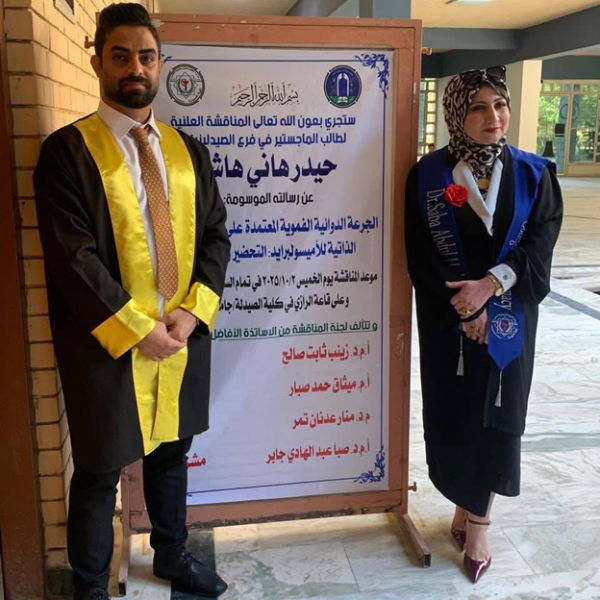The College of Pharmacy discussed the MSc thesis entitled “Amisulpride Self-Nanomicelles Based Oral Dosage Form: Preparation and Characterization” by the student Haider Hani Hashim, and his supervisor Assistant Professor Dr. Saba Abdulhadi Jaber, at the Pharmaceutics Department.
The study aimed to enhance the oral biopharmaceutical behavior, specifically the solubility of Amisulpride by developing self-nano micellar drug delivery systems and prepare these self-nano micelles as both polymeric self-nano micelles (PSNM) and mixed self-nano micelles (MSNM), and subsequently to optimize the most appropriate formulation type based on comparative in vitro studies
The study included, various polymeric and mixed self-nanomicelles (PSNM and MSNM) containing amisulpride were developed using amphiphilic non-ionic polymers including Soluplus®, TPGS, Poloxamer 407, Poloxamer 188, Solutol HS15 and Tween 80. The formulations were designed using the solvent evaporation method and then converted into fast dissolving tablet (FDTs) via direct compression. The physicochemical properties of the formulations were systematically characterized using techniques such as particle size analysis, FTIR spectroscopy, differential scanning calorimetry (DSC) and X-ray diffraction (XRD). The prepared nanomicelles demonstrated particle sizes within the acceptable nanometric range (below 200 nm) and improved drug encapsulation efficiency, which contributed to enhanced solubility and dispersion.
The study showed that Amisulpride nanomicelles (AMS-NM) were successfully prepared using Soluplus® (SLP) as a polymer at a 1:4 ratio (F2), which was identified as the optimized formulation. The F2 nanomicelles exhibited a particle size of 67.1 ± 2.2 nm, PDI of 0.061 ± 0.002, and encapsulation efficiency (EE%) of 73 ± 3.6%, with a clear appearance and uniform nanoscale dispersion.
The in vitro release study demonstrated a remarkable enhancement in the dissolution rate of AMS from the optimized nanomicelles (F2), achieving 100% drug release within 45 minutes, compared to only 55% release from the pure drug. The selected ODT formulation (ODT4) further accelerated release, showing 100% drug dissolution within 10 minutes in simulated oral fluid and within 25 minutes in gastric medium (0.1 N HCl).
The study recommended that further in vivo studies should be conducted to evaluate the pharmacokinetics and bioavailability of the prepared Amisulpride self-nanomicelles, clinical trials are recommended to confirm the safety and efficacy of the developed formulation in human subjects and Evaluation of the formulation’s effect on patient compliance and acceptability is required.




